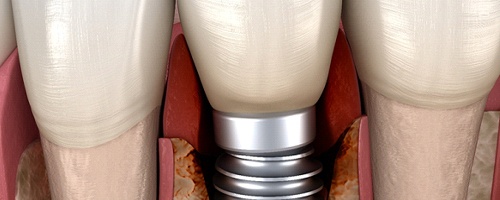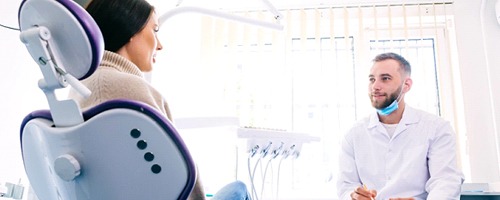
Dental Implant Failure & Salvage – Mesquite, TX
Saving Smiles for a Healthier Future

Dental implants are a worthwhile investment. They have a success rate of about 95% when placed by a skilled professional. After 10 years, they can maintain this success rate if you commit to taking proper care of your new teeth. Although complications are rare, a failed dental implant in Mesquite can happen. At TrueCare Dentistry, we need to know if you suspect there to be a problem with your smile and encourage you to contact us right away at the first sign of trouble. This will allow us to work quickly to provide the necessary treatment and get your smile back on track.
Why Do Dental Implants Fail?

It is uncommon for dental implants in Mesquite to fail, but if they do, it is likely because you have developed peri-implantitis. Much like gum disease that attacks the soft oral tissues of the mouth, this type of infection causes the gums to become inflamed, red, and maybe even bleed. But it’s not just your gums that are the intended target. Your jawbone will weaken over time if left untreated. As a result, it will cause your dental implant to loosen and potentially fall out.
You may also discover the reason for your failed dental implant is due to:
- Severe facial trauma that impacts your dental implant and causes it to become loose or be knocked-out
- The inability for your implant and bone to fuse (osseointegration) during the initial recovery phase
- You have a serious overall health condition or an autoimmune disorder that makes healing almost impossible
Symptoms of Failed Dental Implants

Failed dental implants can happen immediately following your oral surgery or years later. This is why you should be mindful of the possible symptoms and be prepared to seek help if you notice any of the following:
- Pus begins to form near the infected dental implant
- It becomes increasingly difficult for you to bite down or chew
- Pain develops and increases in the days following your dental implant surgery
- You notice your dental implant is loose
- There is swelling and bleeding near your dental implant
How Dental Implant Salvage Works

Dental implant salvage works by meeting with your implant dentist in Mesquite to have them review your oral cavity and questionable implant. Signs of peri-implantitis will need to be treated with periodontal therapy and possibly, a bone graft if the jawbone is too weak. If it is feasible, we will try to perform this service without removing your implant post. If severe trauma is the result, we may need to extract the prosthetic and allow the damaged area to heal before discussing the possibility of reinserting a new implant.
Failed osseointegration will need to be looked at further to determine why it happened. If you have certain lifestyle habits (i.e., smoking) that caused it to happen, or you have an autoimmune disease that prevents timely healing, we’ll need to discuss ways to move forward so implant failure does not occur in the future.